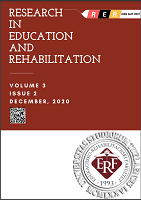PSYCHOMOTOR ABILITIES OF CHILDREN WITH DEVELOPMENTAL DISABILITIES, AS PREDICTORS OF FAMILY FUNCTIONING
PSYCHOMOTOR ABILITIES OF CHILDREN WITH DEVELOPMENTAL DISABILITIES, AS PREDICTORS OF FAMILY FUNCTIONING
Author(s): Amila Mujezinović, Fata Zilić, Armin Osmanović, Alma DizdarevićSubject(s): Developmental Psychology, Health and medicine and law, Family and social welfare, Inclusive Education / Inclusion
Published by: Edukacijsko-rehabilitacijski fakultet Univerziteta u Tuzli
Keywords: children with developmental disabilities; family functioning; psychomotor;
Summary/Abstract: The family environment plays an important role in the development of children with no developmental disabilities and children with developmental disabilities. Most previous studies observe the family environment in terms of its impact on children's outcomes. The aim of this paper is to examine the influence of psychomotor abilities of children with developmental disabilities on family adaptability and cohesion. This research observes and examines the developmental abilities of children with disabilities, as predictors of family functioning. The sample of respondents included a total of 339 respondents, of which 139 children (69 children with developmental disabilities and 70 children without developmental disabilities) as well as 200 parents of children included in the study. The results of the research showed that there are differences in family adaptability of cohesion between families of children with developmental disabilities and families of children without developmental disabilities. Psychomotor abilities of children with developmental disabilities, i.e. their communication abilities, represent significant predictors of family adaptability, while they have not been determined as significant predictors of family cohesion.
Journal: Research in Education and Rehabilitation
- Issue Year: 3/2020
- Issue No: 2
- Page Range: 27-41
- Page Count: 15
- Language: English

